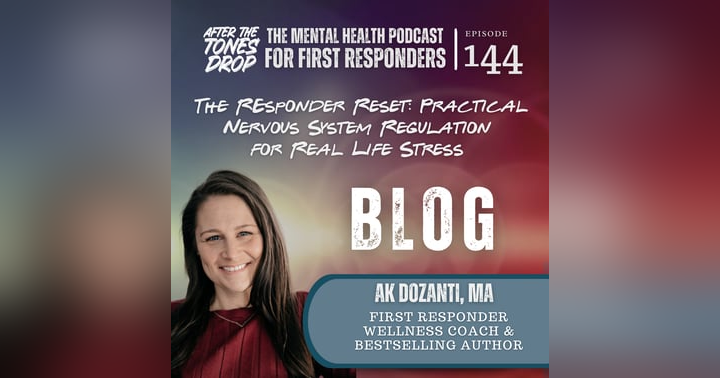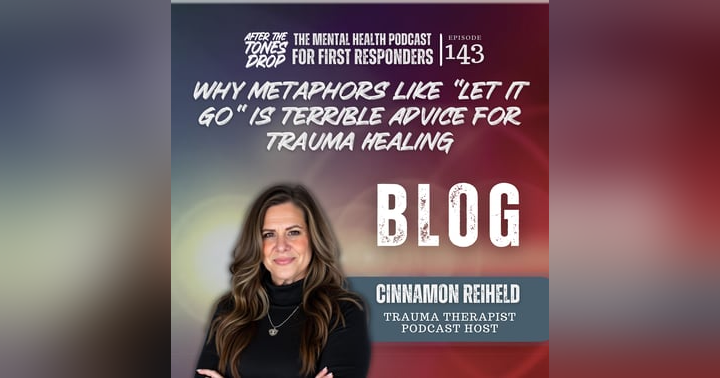First Responder Mental Health: How a Navy SAR Swimmer Overcame PTSD and Suicidal Thoughts

First Responder Mental Health: How a Navy SAR Swimmer Overcame PTSD and Suicidal Thoughts
By Cinnamon Reiheld, Host of After the Tones Drop Podcast
As someone who's spent years listening to the stories of first responders as a trauma therapist, I thought I'd heard it all. Then I sat down with Matt Griffin, a 21-year Navy veteran and former undercover officer, and realized his story could change,or even save,lives in our community.
When Matt pulled survivors from burning helicopters and infiltrated drug operations, he seemed invincible. But the real battle wasn't in the field,it was in his own mind. His raw account of mental health recovery offers hope and practical strategies for first responders struggling with PTSD, depression, and suicidal ideation.
The Hidden Mental Health Crisis Among First Responders
Through my work with After the Tones Drop and my practice at Whole House Wellness, I've witnessed firsthand how first responders face suicide rates significantly higher than the general population. Behind every badge and uniform is a human being processing unimaginable trauma, often without adequate mental health support. Matt's story, which he shared with me during our recent interview, exemplifies this crisis,and more importantly, shows a path forward.
When Heroes Break: The Reality of First Responder Trauma
What struck me most about Matt's story wasn't the dramatic rescues or dangerous undercover work. His breaking point came from the accumulation of unprocessed trauma, particularly after losing his chief to suicide. This tragic event sent Matt spiraling into depression and suicidal thoughts, highlighting a brutal truth I hear too often: those trained to save others, often can't save themselves.
What is the most dangerous misconception in first responder culture? Mistaking stoicism for strength. This mindset prevents seeking help when it's needed most, and creating a cycle of suffering that claims too many lives.
Listen to the full podcast episode HERE
The Breathwork Technique That Changed Everything
During our conversation, Matt shared how one of his super powers centered around a specific practice: Box Breathing. As someone who works with first responders on trauma recovery, I can tell you this isn't trendy wellness content, it's a tactical approach to mental health that, literally rewires the nervous system's response to crisis.
How Box Breathing Works for Mental Health Recovery:
The Science: Box breathing activates the parasympathetic nervous system, reducing cortisol levels and calming the fight-or-flight response that trauma survivors often experience chronically.
The Practice:
- Inhale for 4 counts
- Hold for 4 counts
- Exhale for 4 counts
- Hold empty for 4 counts
- Repeat
Matt learned this technique during his Navy training, but it became his lifeline during his darkest mental health struggles. The beauty? It's accessible anywhere, anytime anxiety or panic strikes.
The Intervention That Saved a Life
What moved me most about Matt's story was his turning point,and the chilling proximity to tragedy. Matt was sitting in his truck at midnight, gun on the dashboard, counting down to end his life. He had put his phone on "Do Not Disturb," but a call broke through on the second try. Startled, he answered.
It was his friend Ben. Not offering quick fixes or empty platitudes, but simply saying, "I'm here for you. Come over for a beer."
That call… that divine intervention or twist of fate, saved Matt's life. From that moment, he took it day by day, rebuilding his purpose and finding his path forward.
This aligns perfectly with what I see in my therapy practice and hear consistently on After the Tones Drop: healing happens in relationship, not isolation. Sometimes we're one moment (or phone call) away from either tragedy or transformation.
Key Mental Health Recovery Insights:
Healing isn't always about self-reliance. Sometimes the most profound recovery happens when we allow others to support us through a crisis.
Community matters. Matt's journey illustrates how isolation amplifies mental health struggles, while connection facilitates healing.
Purpose from pain. Rather than healing despite his trauma, Matt extracted meaning from it, transforming his worst experiences into tools for helping others.
Practical Mental Health Strategies for First Responders
Through my podcast interviews and therapy work, I've identified key patterns in successful mental health recovery among first responders. Matt's approach combines evidence-based practices with real-world application:
1. Nervous System Regulation Through Breathwork
- Use Box Breathing during shift transitions
- Practice before sleep to manage hypervigilance
- Apply during acute stress responses
2. Faith as Mental Health Anchor
- Not toxic positivity, but genuine spiritual grounding
- Provides meaning beyond immediate circumstances
- Offers hope during darkest moments
3. Strategic Vulnerability
- Share struggles with trusted individuals
- Seek culturally competent mental health professionals
- Normalize mental health conversations in first responder culture
4. Daily Mental Fitness Practices
- Small acts of kindness (neuroplasticity benefits)
- Consistent sleep hygiene
- Physical exercise as trauma processing
- Regular check-ins with mental health support
Breaking the Stigma: Mental Health in First Responder Culture
In my years hosting After the Tones Drop, I've heard countless stories about how first responder culture can inadvertently harm mental health. Matt's advocacy, which he shared passionately during our interview, centers on changing how first responder organizations approach mental health:
The Problem: Culture that views seeking help as weakness
The Solution: Reframing mental health care as operational readiness
Just as first responders maintain physical fitness and tactical skills, mental fitness requires ongoing attention and professional support.
Resources for First Responder Mental Health
If you're a first responder struggling with mental health challenges:
- Crisis Hotline: National Suicide Prevention Lifeline: 988
- First Responder Support: First Responder Support Network
- Professional Help: Contact me for therapy services specializing in first responder trauma
- Peer Support: Connect with other first responders in recovery
- Essential Reading: Matt Griffin's "Journey to Midnight" - a bestselling book that could save your life
The Bottom Line: Recovery is Possible
Matt's transformation from that midnight moment in his truck to becoming a bestselling author and mental health advocate proves that the same qualities that make someone an effective first responder (courage, service, tactical thinking) can be redirected toward mental health recovery.
He's documented his complete journey in his bestselling book "Journey to Midnight," which provides an unfiltered look at his path from the brink of suicide to purposeful living. This isn't inspiration without action,it's a detailed roadmap from someone who walked through the darkness and emerged with tools to help others do the same.
That's exactly why I created After the Tones Drop,to share these vital stories that can save lives. Matt's book is an essential read for anyone in the first responder community or those who love them.
Your Mental Health Matters
Whether you're currently struggling or supporting someone who is, remember: seeking help isn't giving up, it's gearing up for the fight of your life. Matt's story, detailed fully in his book "Journey to Midnight," demonstrates that recovery isn't just possible; it's a pathway to purpose.
The people trained to save everyone else deserve to be saved too. Your mental health recovery could be the difference between surviving and thriving, not just for you, but for everyone whose life you touch.
This story is part of my ongoing mission through After the Tones Drop podcast and Whole House to support first responder mental health. You can listen to my complete interview with Matt Griffin Episode 111 on After the Tones Drop, where he shares even more about his journey and daily practices. Sometimes the most powerful weapon against mental health struggles is knowing you're not alone in the fight.
About the Author:
Cinnamon Reiheld is the host of After the Tones Drop podcast, dedicated to supporting first responder mental health and wellness. Through her work at Whole House and her podcast platform, Cinnamon Reiheld provides resources, stories, and hope to those who serve our communities. Learn more at whole-house.com.



